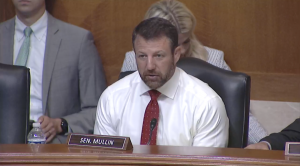
Whether President Biden will sign the measure is one thing, but the House and the Senate have now passed Oklahoma Sen. Markwayne Mullins bill to reverse the president’s unprecedented and overreaching endangered classification of the northern long-eared bat.
Mulling said his bill was to cut “runaway regulation” and reverse Biden’s harmful bureaucratic penalties that are hurting Oklahoma landowners, businesses and infrastruture projects.
The measure won support in the House following approval in the Senate to strike down the administration’s listing of the northern long-eared bat (NLEB) as ‘endangered’ under the Endangered Species Act passed with bipartisan support.
“The decision to arbitrarily classify the northern long-eared bat as ‘endangered’ will have serious consequences for landowners, businesses, and infrastructure projects across the state,” said Senator Mullin when the Senate first passed the bill.
“There is no reason to disproportionately increase regulatory burden and hinder economic development when this rule will not affect the primary cause of decline for the northern long-eared bat. I am strongly against one-size-fits-all regulation from Washington bureaucrats, and this is no different. We must stop this reclassification and ensure our state and other impacted states can continue efforts to protect the northern long-eared bat without the heavy hand of the federal government getting in their way.”

Listing the NLEB as ‘endangered’ forces blanket prohibitions across the country, leaving countless infrastructure project consultations in limbo that affect crop production, animal feeding operations, grazing, irrigation, power generation and transmission, roads, bridges, communication towers, dams, levees, pipelines, wastewater treatment, water supply, residential and commercial development, forestry, military operations, and mining. As a result of this up-listing, public and private landowners conducting activities that are “reasonably certain” to result in incidental take of the species will also have to develop habitat conservation plans and secure a permit from the federal government. In addition, any activity funded, authorized, or permitted by a federal agency will have to go through a lengthy Endangered Species Act Section 7 consultation process to ensure those activities don’t affect the species.
U.S. Senators Shelley Moore Capito (R-WV), Joe Manchin III (D-WV), Cynthia Lummis (R-WY), Roger Marshall (R-KS), Ted Budd (R-NC), John Boozman (R-AR), James Lankford (R-OK), Kevin Cramer (R-ND), Dan Sullivan (R-AK), Roger Wicker (R-MS), Tommy Tuberville (R-AL), Katie Boyd Britt (R-AL), Tom Cotton (R-AR), and John Hoeven (R-ND) joined Mullin on this legislation. The House version of the CRA was introduced by Congressman Pete Stauber (MN-08).
Background:
- On November 30, 2022, the U.S. Fish and Wildlife Service (FWS) published its final rule listing the northern long-eared bat as endangered under the Endangered Species Act.
- After Republican opposition, FWS announced it would delay the effective date for the final rule to March 31, 2023.
- On March 6, 2023, FWS announced interim guidance to assist stakeholders in the transition to the reclassification.
- FWS has identified 3,095 projects for which an incidental take statement will be needed as a result of the up-listing of the NLEB.





